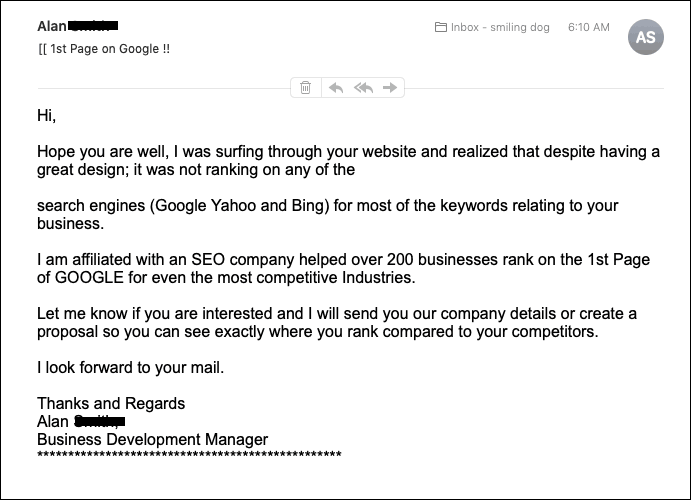SEO “Experts” & Google Search Results
Scammers often try to contact my clients to see if they can sell them on SEO (Search Engine Optimization). While some SEO experts can be legit, there are a few things to keep in mind.
Some “SEO Expert” Red Flags:
- SEO Expert promises to get your business on the 1st page of results.
- SEO Expert makes claims about past clients coming up first in search results, but can’t give a list of clients with said search terms they wanted to come up under.
- SEO Expert suggests adding keyword META tags to your web site pages. In 2009 Google stopped using keyword meta data to determine page rank. Other search engines still use META tags, but Google is currently the dominant search engine

Things to Keep in Mind
- Your main focus is Google. As of October of 2019 Google holds an 87.96% search engine market share. Bing and Yahoo come in next around 4% each, so if we’re talking about search engines, your main focus is really Google.
- Google doesn’t disclose how they rank web sites or how they determine what search terms they come up under (otherwise people would abuse that information like they used to).
Considering Google has the majority of the search-engine market and they don’t disclose how they rank information, my first instinct (when I hear about an SEO expert/business) is that it’s probably a scam. It doesn’t mean they don’t do anything, but they typically inflate their worth because you don’t really have a way of measuring results or knowing better. It’s like going to a doctor or a mechanic. Word-of-mouth and results/examples are your best tools.
How Does Google Rank Web Sites?
While Google doesn’t disclose how they rank sites, people have gathered clues that the way they rank things has to do with the following:
- The popularity of your site. Do other sites link to your site? If so, Google notices when they crawl/index those sites (“Hey, all these sites are linking to www.yourbusiness.com… it must be important. Let’s raise the ranking of www.yourbusiness.com”).
- Does your site contain the text that you want to come up under in a Google search? Google looks at your pages content to help determine what search terms brings up your site. Is it in the body, the header, the title of the page?
- How other sites link to your site. For instance do other web sites contains text that has “Greatest Widgets” that links to your web site? A lot of them? If so, that will also help raise your ranking for when people search for “Greatest Widgets”. But, ultimately, it’s out of your control what other people are going to use as text when linking to your web site.
- The location of the user/searcher. Google is location-aware. People in one part of the country are typically going to get different results than people in another. This is helpful when you have the same business name as a company in another state, but not as helpful if you’re trying to have national appeal.
Things You Can Do That May Help (Mostly FREE):
- First, and most importantly, make sure your site is actually being indexed by Google. When you search for your domain (www.yourbusiness.com) does it show up in Google?
- Make sure the preferred search terms/text is actually on the pages of your web site. If it’s not, Google has nothing to work with.
- Make sure your site has a SSL security certificate. This won’t help your ranking, but Google won’t penalize you for not having one either.
- Have a functional mobile version of your web site. Same as above.
- Claim your physical business address on Google/Google Maps. May not help with ranking, but does help when people are trying to find you (which is the main goal).
- Set your site up with Google Analytics. You’ll be able to tell what people are searching for when they get to your site from Google, as well as a host of other information about browser type and mobile vs. desktop users.
Paid Things You Can Do That May Help:
- Google Advertising. This will bring you to the front page, it’s just a matter of it if will actually bring you business. You may be paying a lot to compete with some search terms (and it may just be as unrealistic as well). Problem with Google Advertising is that some customers have ad blockers, and some just never click on ads. It depends on your target market and how much you want to budget.
- Facebook/Twitter/Instagram. If you’re in retail, these social media platforms can be a great way to connect with potential and existing customers. Simply setting up a free account can help, but paid advertising on these platforms help target your potential customers. These platforms know just about everything about their users.
- Conventional Advertising (Radio/Paper). Yes, it still exists.
Things You Can’t Do:
- Compete with multi-million dollar aggregate web sites. I have a client that wanted to come up on the first page for specific search terms, and nearly ever result on the first page was for multi-million-dollar aggregate web sites. Even their higher-end local competitors weren’t coming up on the first page of results. For example, if you search for “Real Estate” chances are your first 3 (non-advertisement) results are going to be realtor.com, zillow.com and redfin.com—all corporate aggregate web sites. No matter where you are located in the U.S. there is a good chance these companies will be the first results in Google because they offer a large amount of data for every city and are highly trafficked web sites.
- Buy your way to the top. Unless you have a company that actually competes with similar multi-million-dollar aggregate web sites (and the infrastructure that comes with it), you’re never going to be able to pay someone to magically put you at the top of Google search results for such basic search terms. You either need to be listed on their sites, or find other avenues of advertising. C’est la vie!

FINAL NOTES ON SEO:
That’s the basics on my understand of how Google works. I’m sure there are other tips/tricks and optimizations that can help raise your ranking for certain search terms, but be aware that just because someone calls themself an SEO expert, it doesn’t mean they can deliver you customers.
If some SEO experts were actually able to produce what they promised, I would whole-heartedly suggest you pay them immediately to come up first on Google. I would also point all my other clients their direction and maybe even change careers and start selling their services. I’m always open to new/better ideas. Unfortunately, I have yet to see one make good on their promises.
YOUR OBJECTIVES:
But, let’s back up. Your main objective really isn’t search terms or rankings, it’s business. First thing I always tell clients is two-fold:
- “Look at your competition. What are they doing?”
- “Put yourself in the position of a future customer. What are they doing?”
Those two things alone should help put you in the right direction.
